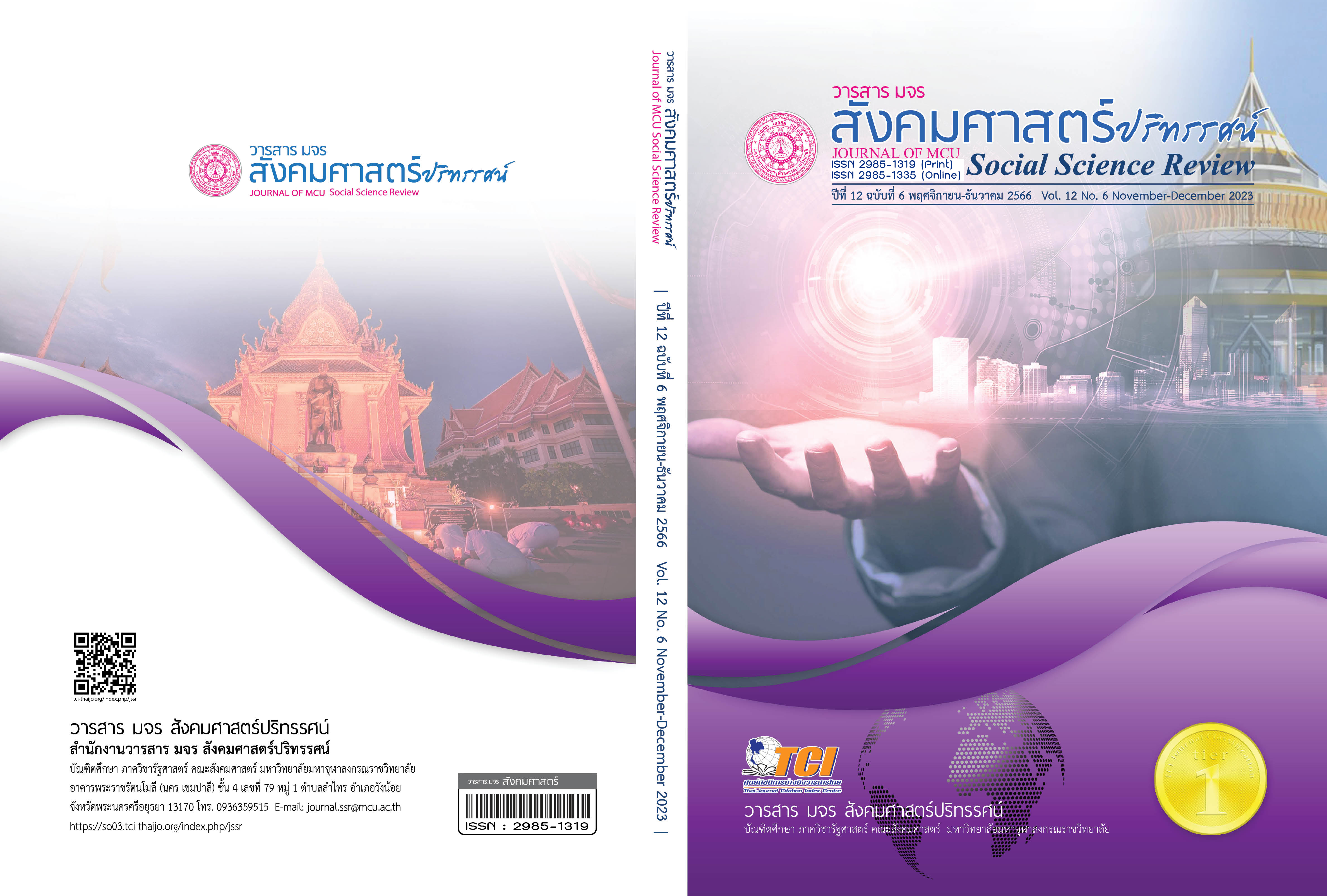ผลการจัดกิจกรรมการศึกษานอกระบบโรงเรียนตามแนวคิดการเรียนรู้แบบร่วมกันที่มีต่อการยอมรับความหลากหลายทางวัฒนธรรมของนักศึกษา การศึกษานอกระบบโรงเรียน
คำสำคัญ:
การเรียนรู้แบบร่วมกัน, ความหลากหลายทางวัฒนธรรม, กิจกรรมการศึกษานอกระบบโรงเรียนบทคัดย่อ
บทความวิจัยนี้มีวัตถุประสงค์ 1. วิเคราะห์ระดับการยอมรับความหลากหลายทางวัฒนธรรมของนักศึกษาศูนย์การศึกษานอกระบบและการศึกษาตามอัธยาศัยในกรุงเทพมหานคร 2. ผลของการจัดกิจกรรมการศึกษานอกระบบโรงเรียนตามแนวคิดการเรียนรู้แบบร่วมกันที่มีต่อการยอมรับความหลากหลายทางวัฒนธรรมของนักศึกษาศูนย์การศึกษานอกระบบและการศึกษาตามอัธยาศัยการวิจัยนี้เป็นเชิงทดลอง การเลือกกลุ่มตัวอย่างใช้การเลือกแบบเจาะจง โดยการสุ่มแจกแบบสอบถามกับเขตที่มีจำนวนนักศึกษาชาวต่างชาติจำนวนมาก ทั้งสี่เขต คือ เขตบางบอน เขตบางขุนเทียน เขตห้วยขวาง และเขตสาทร กลุ่มตัวอย่างที่ใช้ศึกษาจำนวน 183 คน จากนั้นนำระดับการยอมรับความหลากหลายทางวัฒนธรรมมาวิเคราะห์เพื่อต่อยอดไปสร้างแผนและจัดกิจกรรมและศึกษาผลของการจัดกิจกรรมการศึกษานอกระบบโรงเรียนตามแนวคิดการเรียนรู้แบบร่วมกันที่มีต่อการยอมรับความหลากหลายทางวัฒนธรรมต่อไป
ผลการวิจัยพบว่า 1. ศูนย์การศึกษานอกระบบเขตสาทร มี ค่าเฉลี่ยรวมทั้ง 3 ด้าน (ความตระหนัก ความรู้ ทักษะทางวัฒนธรรม) สูงที่สุด เขตบางขุนเทียน เขตบางบอน และเขตห้วยขวาง ตามลำดับ 2. ก่อนจัดกิจกรรมนักศึกษาเขตห้วยขวางระดับชั้นประถมศึกษา หลังจัดกิจกรรม โดยค่าเฉลี่ยหลังเข้าร่วมกิจกรรม มีค่าเฉลี่ยสูงกว่าก่อนจัดกิจกรรม ที่ 0.72 คะแนน ผลการเปรียบค่า (t-test) มีค่า -26.40 แสดงว่ามีนัยสำคัญทางสถิติที่ระดับ .01 สรุปได้ว่ากิจกรรมการศึกษานอกระบบโรงเรียนตามแนวคิดการเรียนรู้แบบร่วมกันมีผลต่อการยอมรับความหลากหลายทางวัฒนธรรมของนักศึกษาการศึกษานอกระบบโรงเรียน
เอกสารอ้างอิง
ชุตินันท์ จันทรเสนานนท์ และคณะ. (2553). การพัฒนาแบบวัดสมรรถนะเชิงวัฒนธรรม สำหรับนักเรียนมัธยมศึกษา. วารสารครุศาสตร์, 40(1), 43-58.
ธเนศ วงศ์ยานนาวา. (2560). On Multiculturalism: ว่าด้วยความหลากหลายทางวัฒนธรรม. กรุงเทพฯ: สำนักพิมพ์สมมติ.
ภัษรินทร์ พิณทอง. (2565, 24 มิ.ย.2565). นักศึกษาศูนย์การศึกษานอกระบบและการศึกษาตามอัธยาศัย เขตห้วยขวาง ระดับประถมศึกษา [สัมภาษณ์].
วิเชียร พันธ์เครือบุตร. (2557). สมรรถนะการประกอบวิชาชีพและความสามารถ ทำงานข้ามวัฒนธรรมในประชาคมอาเซียนของบัณฑิตไทย. วารสารการพัฒนาชุมชนและคุณภาพชีวิต, 2(2), 225-232.
สารีพันธุ์ ศุภวรรณ. (2545). การพัฒนาโปรแกรมการศึกษานอกโรงเรียนตามแนวคิดการเรียนรู้แบบร่วมกันเพื่อพัฒนาทักษะการแก้ปัญหาของเด็กเร่ร่อน (ดุษฎีนิพนธ์ศึกษาศาสตร ดุษฎีบัณฑิต สาขาวิชาการศึกษานอกระบบโรงเรียน). กรุงเทพฯ: จุฬาลงกรณ์มหาวิทยาลัย.
สิรินทร์ ลัดดากลม บุญเชิดชู. (2559). การพัฒนาความสามารถด้านการคิดสร้างสรรค์ของนักศึกษาสาขาวิชาการศึกษาปฐมวัยโดยใช้กระบวนการจัดการเรียนรู้แบบกำกับตนเอง. Veridian E-Journal, Silpakorn University, 9(2), 1245-1261.
สุชีพ กรรณสูต. (2552). ทฤษฎีการแพร่กระจายทางวัฒนธรรม. สืบค้น 15 มีนาคม 2563, จาก http://sucheeppost.blogspot.com/2009/05/blog
อมรวิชช์ นาครทรรพ. (2546). การบูรณาการการเรียนรู้วัฒนธรรมกับการศึกษาของต่างประเทศ. กรุงเทพฯ: พริกหวานกราฟฟิค จำกัด.
อมรา พงศาพิชญ์. (2547). ความหลากหลาายทางวัฒนธรรม กระบวนทัศน์และบทบาทใน ประชาสังคม. กรุงเทพฯ: สำนักพิมพ์แห่งจุฬาลงกรณ์มหาวิทยาลัย.
อาชัญญา รัตนอุบล และนวลเสน่ห์ วงศ์เชิดธรรม. (2534). การวิจัยการศึกษานอกระบบชุดวิชาประสบการณ์วิชาชีพการศึกษานอกระบบ (เล่ม 1 หน่วยที่ 7). นนทบุรี: สำนักพิมพ์หาวิทยาลัยสุโขทัยธรรมาธิราช.
อาภรณ์ ใจเที่ยง. (2550). หลักการสอน. กรุงเทพฯ: สำนักพิมพ์โอเชี่ยนสโตร์.
โอภาส เกาไศยาภรณ์. (2555). เครือข่ายสังคมเชิงเสมือนกับการพัฒนาการจัดการศึกษาในสังคมพหุวัฒนธรรม. วารสารศึกษาศาสตร์ มหาวิทยาลัยศิลปากร, 10(1), 5-14.
Balkcom, S. (1992). Cooperative learning. Education Research Consumer Guide. Retrieved March 20, 2020, from http://www.ed.gov/pubs/OR/Consumer
Barkley, E. F., et al. (2014). Collaborative learning techniques: A handbook for college faculty. San Francisco, CA: JosseyBass.
Chiu, C.-Y., & Hong, Y.-Y. (2013). Social psychology of culture. New York: Psychology Press.
Yamane, T. (1967). Statistics, An Introductory Analysis. New York: Harper and Row.
ดาวน์โหลด
เผยแพร่แล้ว
รูปแบบการอ้างอิง
ฉบับ
ประเภทบทความ
สัญญาอนุญาต
ลิขสิทธิ์ (c) 2023 วารสาร มจร สังคมศาสตร์ปริทรรศน์

อนุญาตภายใต้เงื่อนไข Creative Commons Attribution-NonCommercial-NoDerivatives 4.0 International License.
เพื่อให้เป็นไปตามกฎหมายลิขสิทธิ์ ผู้นิพนธ์ทุกท่านต้องลงลายมือชื่อในแบบฟอร์มใบมอบลิขสิทธิ์บทความให้แก่วารสารฯ พร้อมกับบทความต้นฉบับที่ได้แก้ไขครั้งสุดท้าย นอกจากนี้ ผู้นิพนธ์ทุกท่านต้องยืนยันว่าบทความต้นฉบับที่ส่งมาตีพิมพ์นั้น ได้ส่งมาตีพิมพ์เฉพาะในวารสาร มจร สังคมศาสตร์ปริทรรศน์ เพียงแห่งเดียวเท่านั้น หากมีการใช้ภาพหรือตารางหรือเนื้อหาอื่นๆ ของผู้นิพนธ์อื่นที่ปรากฏในสิ่งตีพิมพ์อื่นมาแล้ว ผู้นิพนธ์ต้องขออนุญาตเจ้าของลิขสิทธิ์ก่อน พร้อมทั้งแสดงหนังสือที่ได้รับการยินยอมต่อบรรณาธิการ ก่อนที่บทความจะได้รับการตีพิมพ์ หากไม่เป็นไปตามข้อกำหนดเบื้องต้น ทางวารสารจะถอดบทความของท่านออกโดยไม่มีข้อยกเว้นใดๆ ทั้งสิ้น





